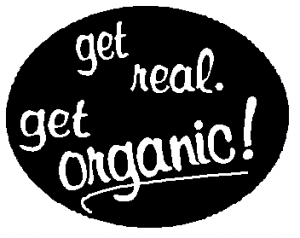Are you tired of swallowing . . .
Genetically Engineered foods?
Irradiated foods?
Pesticide residues?
Cruelty grown foods?
Antibiotic-laced foods?
You make a difference every time you shop for your dinner. You decide what kinds of foods are grown, how they are grown, and where they are grown by deciding what you purchase and where you make your purchases.
In the end, you make the decisions about what kind of world we will have—both globally and locally—by supporting one kind of farmer or another. Small local farmers value your purchases and even the purchase of a few dollars worth of food makes a difference to them. These farmers also maintain an agricultural community producing foods for local people and maintaining farmland and farming as a way of life. An ever-increasing number of these small local producers are going organic as they realize that not only is their produce better received by the public, but they avoid exposing themselves and their families to the usual array of agricultural poisons.
If you are tired of swallowing “Wild” Maine blueberries that are a heavily managed crop sprayed numerous times with some of the most toxic poisons ever produced, then you can avoid these poisons and avoid supporting this type of industrialized agriculture by looking for organic growers.
If you dislike seeing Maine potatoes planted with poison powders that get into the growing plant to kill insects that feed on the foliage months later and then feeding these potatoes to your family, then look for your local organic grower.
If you are wary of being a guinea pig for the FDA by consuming untested genetically engineered Frankenfoods, you are not alone. Many parts of the world have refused to purchase American seeds and foodstuffs because they don’t believe the corporate assertions about genetic engineering. They understand that genetic engineering mostly improves corporate profits and could indeed be dangerous for people to eat them and creates a type of environmental pollution that has a life of its own. Organic standards, however prohibit the use of any genetically engineered product.
If you are bothered by the cruelty involved in confining animals in small cages or stalls all their life, being fed antibiotics to be kept alive in crowded unhealthy conditions, producing meat, milk and eggs for a public blind to what they are eating, then you might just want to find organic growers out there who are treating their animals with the decency and respect they deserve.
If you want to say NO when you are asked if you “got milk?” produced with the artificial BST hormone which forces cows to give more milk and results in more cow diseases—and hence more antibiotics fed to those cows—then you’ll want to find an organic dairy farmer to supply your family.
If you find it distasteful that sludge from municipal sewage facilities and industrial lagoons is added as a nitrogen fertilizer for field crops, even though sludges are known to often contain heavy metals and petrochemical impurities, then you will be saddened to realize that sludge spreading on crop fields is not infrequent in Maine. Organic standards, however, prohibit the use of sludges in organic food production.
If you are disturbed by irradiating foods for the purposes of giving foods a longer shelf life and covering up dirty practices in poorly regulated processing plants, then you understand why irradiation is being forced upon us. Killing all microbes—even the good ones—make irradiated foods more susceptible to re-inoculation by harmful germs. FDA requires only that whole foods (not food ingredients) be labeled when irradiated. Irradiation means exposing foods to radiation equivalent to 10-70 million chest X-rays, which destroys vitamins, enzymes and other nutrients just so that the foods may be shipped to distant markets more conveniently for the corporations in control of our food system. You can avoid irradiated foods by only buying organic, as no organic foods are ever irradiated.
Are you are saddened by the trail of destruction—unseen by us—left behind by cheap food produced by industrial agriculture, the pesticides in the water and on the people working in agriculture, increased erosion due to mechanized agriculture and use of marginal land, sedimentation and desertification from irrigation and mono-culture, displaced people and destroyed communities and swelling mega-cities, the energy intensive, CO2 producing growing practices? You understand that the residues of pesticides in our fruits and vegetables biomagnify in our meats, fish and dairy to levels that already affect our nervous, immune and reproductive systems and endocrine-regulated metabolism.
Often we do not count all those costs in our cheap food; the pollution, the poison, the contamination, the human suffering and the people who are not fed. We should consider our purchases of local organic foods as part of our contribution to a healthy environment and to reviving farming communities and the small businesses that surround them. And, of course, to a healthier and tastier dinner.
Get to know the folks who live near you and produce your food and learn more about how your food is grown. Learn the nature and extent of your local foodshed, the area around you where your foods are produced. Support Organic Agriculture by supporting Organic Farmers.
LET’S GO LOCAL! LET’S GO ORGANIC!
